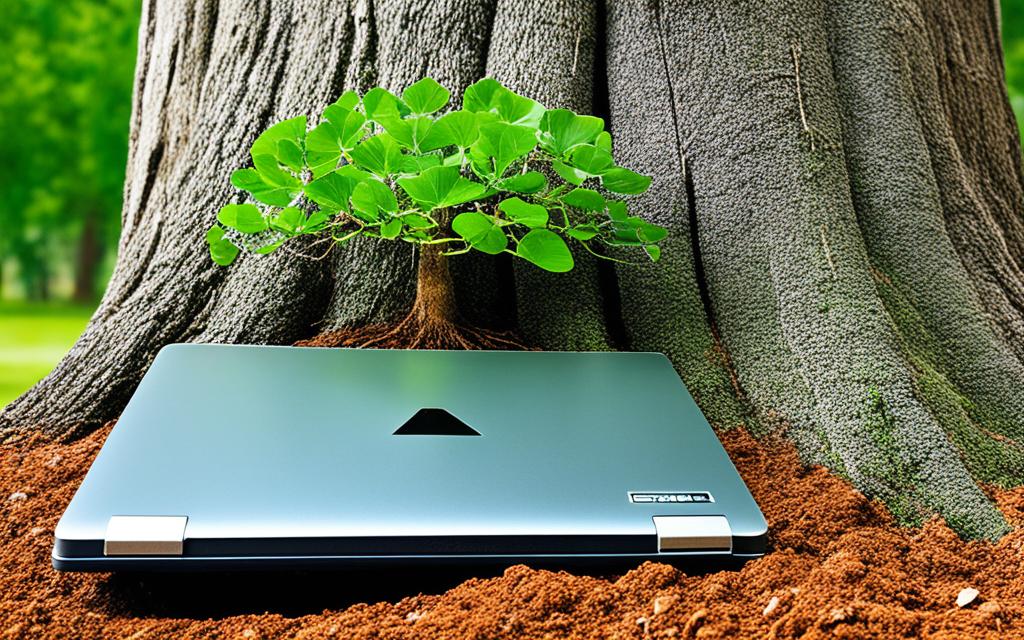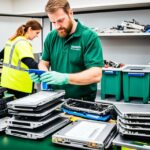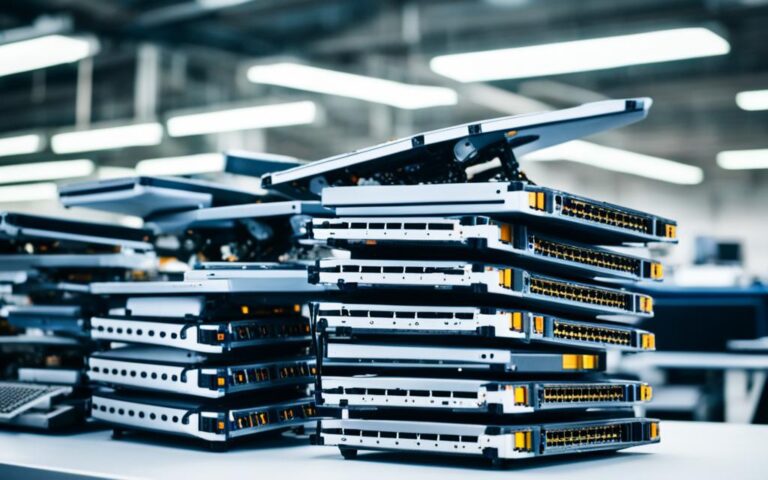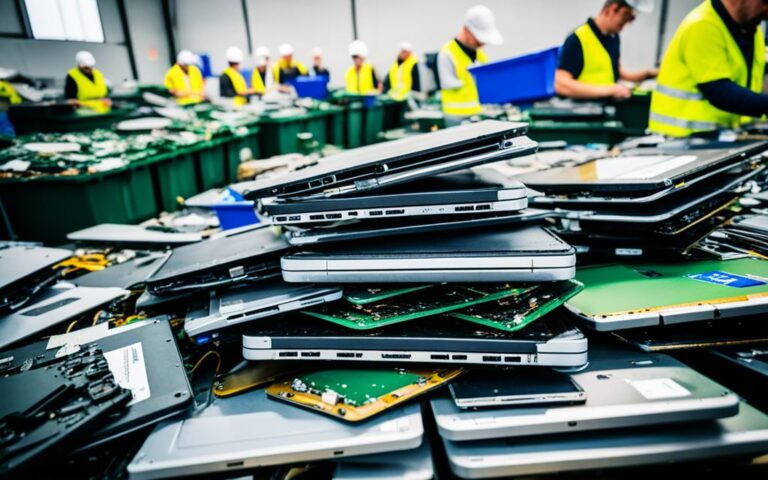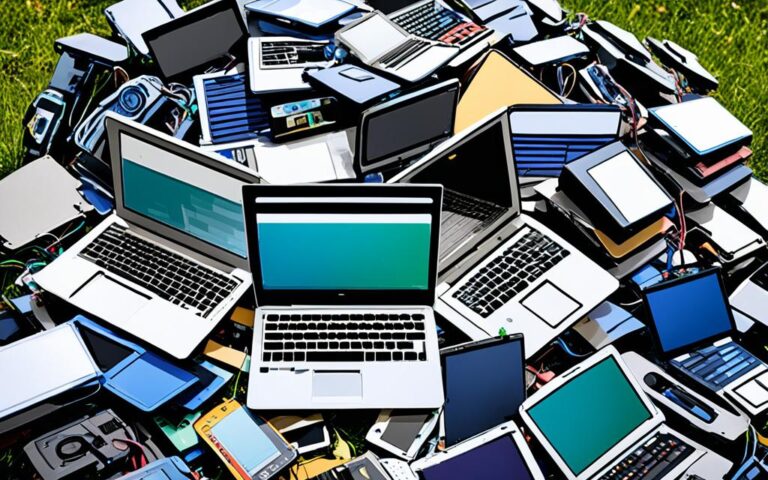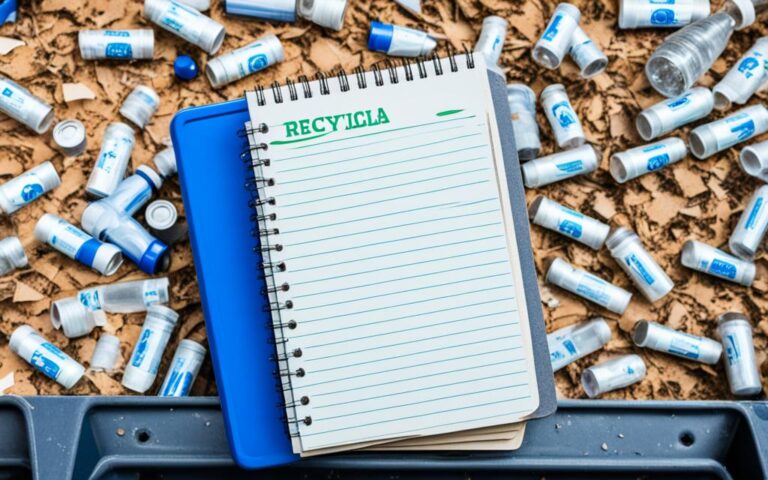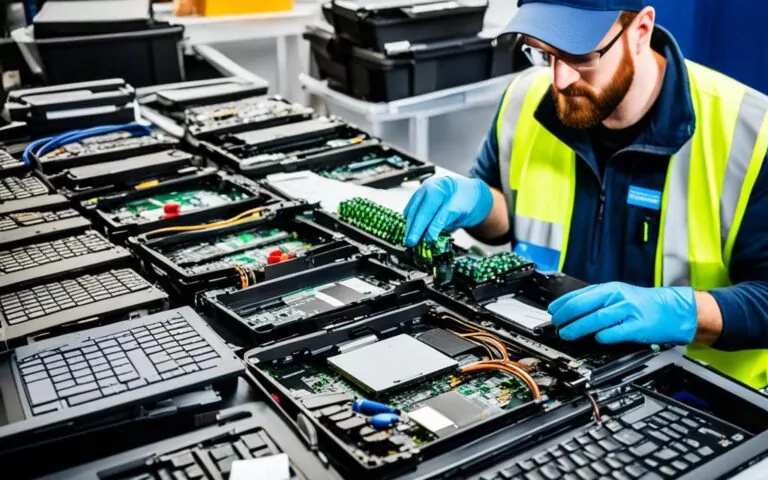Ultrabook Recycling: A Step Towards Greener Technology
Ultrabook recycling
is an essential practice that contributes to
sustainability
and promotes
greener technology
. By responsibly disposing of old laptops, we can reduce electronic waste and minimize our carbon footprint. Embracing this
eco-friendly practice
allows us to declutter our technology while making a positive impact on the environment. Recycling ultrabooks is a step towards a more sustainable future, where electronic devices are repurposed and their valuable resources are conserved.
The Importance of Ultrabook Recycling
Ultrabook recycling plays a vital role in promoting both data security and environmental responsibility. By embracing recycling practices that involve remanufacturing old laptops, we can make significant strides in reducing e-waste and contributing to a circular economy.
When businesses choose remanufactured laptops, they not only prioritize data security but also actively support carbon neutrality and e-waste reduction. These remanufactured laptops offer high-quality performance that is virtually indistinguishable from brand-new devices while minimizing their environmental impact.
The Circular Economy and Environmental Responsibility
Recycling ultrabooks is a crucial step towards achieving a circular economy, where resources are conserved, and waste is minimized. The remanufacturing process ensures that valuable materials, such as metals and plastics, are recovered and repurposed instead of being discarded.
By actively participating in ultrabook recycling, businesses demonstrate their commitment to environmental responsibility. They contribute to the reduction of electronic waste and the conservation of valuable resources, ultimately making a positive impact on the environment.
Choosing remanufactured laptops enables enterprises to uphold data security, support carbon neutrality, and actively contribute to e-waste reduction.
Enhancing Data Security while Reducing Carbon Footprint
Data security is a paramount concern for businesses when disposing of old laptops. By choosing remanufactured laptops through the process of ultrabook recycling, enterprises can ensure that sensitive data is securely handled and destroyed.
In addition to data security, recycling ultrabooks also helps businesses reduce their carbon footprint. By opting for remanufactured devices instead of purchasing new ones, companies actively minimize the environmental impact associated with manufacturing and mining resources.
The Benefits of Ultrabook Recycling
The benefits of ultrabook recycling extend beyond data security and environmental responsibility. By embracing this sustainable practice, businesses can enjoy significant cost savings compared to purchasing brand-new laptops.
Furthermore, the remanufacturing process prioritizes resource recovery, effectively reducing waste and conserving valuable materials. Remanufactured laptops also come with equivalent warranties, providing reliability and peace of mind for businesses.
| Benefits of Ultrabook Recycling |
|---|
| Significant cost savings |
| Resource recovery and waste reduction |
| Equivalent warranties for reliability |
Choosing to recycle ultrabooks not only offers environmental benefits but also delivers economic value for businesses.
The Benefits of Ultrabook Recycling
Recycling ultrabooks offers a multitude of benefits for enterprises. Firstly, it provides significant cost savings compared to purchasing brand-new laptops, with potential savings of up to 40%. By opting for recycled ultrabooks, businesses can allocate their budgets more efficiently, allowing for investments in other areas of the organization.
Additionally, the process of remanufacturing prioritizes resource recovery, minimizing waste and conserving valuable materials. This sustainable approach not only reduces the environmental impact but also supports the circular economy by repurposing components and reducing the need for mining and manufacturing new laptops. Companies that prioritize resource recovery through ultrabook recycling contribute to a more sustainable future.
Moreover, remanufactured laptops come with equivalent warranties to brand-new models, ensuring peace of mind and reliable performance. Enterprises can have confidence in the quality and functionality of the recycled ultrabooks, achieving the same level of reliability as their new counterparts. This assurance allows businesses to seamlessly integrate recycled ultrabooks into their operations without compromising productivity or efficiency.
Overall, choosing to recycle ultrabooks not only benefits the environment but also offers economical value for businesses. The cost savings, resource recovery, warranty, and reliable performance provided by recycled ultrabooks make them a compelling choice for organizations seeking sustainable and cost-effective technology solutions.
The Process of Ultrabook Recycling
When it comes to ultrabook recycling, a systematic process is followed to ensure efficient and responsible disposal of these devices. The process involves various stages, each contributing to the promotion of a circular economy and the conservation of valuable resources.
- Collection and Sorting: Ultrabooks are collected and sorted based on their condition. This step helps in identifying devices that can be refurbished or remanufactured, minimizing waste and maximizing resource recovery.
- Data Destruction: Before recycling, thorough data destruction is performed to ensure the complete obliteration of personal and sensitive information. This step ensures data security and confidentiality.
- Dismantling and Separation: Once the data is securely removed, the laptops undergo dismantling. Different components such as metal, plastic, and glass are carefully separated to facilitate their respective recycling processes.
- Material Recovery: After dismantling and separation, the individual materials are sent for recycling. Metals are melted down to be used for manufacturing new products, plastics are processed for reuse, and glass is crushed to be used in various applications.
This process of ultrabook recycling not only diverts electronic waste from landfills but also promotes a circular economy by repurposing materials and reducing the need for mining and manufacturing new components. By embracing this eco-friendly practice, we contribute to a more sustainable future and strive towards a greener technology industry.
Ultrabook recycling is a vital step in achieving environmental responsibility and reducing the carbon footprint associated with technology. Through proper collection and sorting, data destruction, dismantling and separation, and material recovery, we can make a significant impact on the growing issue of electronic waste. By embracing the principles of the circular economy, we can ensure the responsible disposal of ultrabooks while conserving valuable resources and promoting sustainability.
Conclusion
Ultrabook recycling plays a vital role in driving greener technology and sustainable practices. When we recycle our old laptops, we not only minimize electronic waste but also conserve valuable resources and reduce our environmental impact. By embracing the process of remanufacturing, we prioritize data security while making a positive contribution to the environment. Recycling ultrabooks is not just an economical choice; it is a responsible way to declutter our technology and work towards a more sustainable future.
Together, through laptop recycling, we can build a greener and more sustainable world. By choosing to dispose of our laptops responsibly, we can significantly reduce our carbon footprint and alleviate the pressure on landfills. It is a collective effort that empowers individuals and businesses to make a difference in the fight against electronic waste. Let’s join hands in taking this essential step towards environmental sustainability.
As we continue on this path of sustainable practices, it is crucial to be mindful of the environmental impact of our technology choices. By recycling our laptops, we demonstrate our commitment to responsible disposal, resource conservation, and a circular economy. Every laptop we recycle brings us one step closer to a future where electronic devices are repurposed, and their valuable materials are given a second life.
In conclusion, laptop recycling is not just a buzzword; it is a necessary action for a sustainable future. Let’s harness the power of recycling and make conscious decisions when it comes to our electronic devices. Together, we can make a lasting impact on the environment and pave the way for a more sustainable tomorrow.
FAQ
What is ultrabook recycling?
Ultrabook recycling is the process of responsibly disposing of old laptops to reduce electronic waste and minimize our carbon footprint. It involves collecting and sorting the laptops, performing data destruction to ensure personal information is obliterated, dismantling the laptops into component categories, and sending the materials for recycling.
Why is ultrabook recycling important?
Ultrabook recycling is important because it promotes greener technology and sustainability. By recycling old laptops, we can minimize e-waste, conserve valuable resources, and reduce our carbon footprint. It also contributes to a circular economy by repurposing materials and reducing the need for mining and manufacturing new components.
What are the benefits of ultrabook recycling?
Ultrabook recycling offers several benefits. Firstly, it provides significant cost savings compared to purchasing brand-new laptops, with potential savings of up to 40%. Secondly, the process prioritizes resource recovery, minimizing waste and conserving valuable materials. Thirdly, remanufactured laptops come with equivalent warranties to brand-new models, ensuring peace of mind and reliable performance.
How does the process of ultrabook recycling work?
The process of ultrabook recycling involves several stages. Firstly, the laptops are collected and sorted based on their condition. Data destruction is then performed to ensure the complete obliteration of personal information. Afterward, the laptops undergo dismantling, with components separated into categories such as metal, plastic, and glass. Finally, the individual materials are sent for recycling, where metals are melted down, plastics are processed, and glass is crushed.

